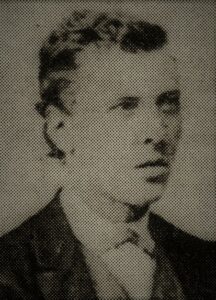
Jón Ólafsson
Jón Ólafsson went west for the second time in 1900, now to Winnipeg. Once again, his writings in newspapers in Iceland had failed. This time it was the booklet “Eitt orð af viti um Vesturfarir”, which was published in Reykjavík in 1888. Jón got into legal proceedings and was fined for his writings, but he had friends in the West because he was sent $300.00 as a gift and was offered the position of Lögberg’s assistant editor. Jon arrived in Winnipeg on April 20, 1890 and started working at the paper. He became the editor-in-chief of the newspaper for a short time, did not get along with the founders, and left the job. He did not give up, founded another newspaper, “Öldin” which published its first issue on October 7, 1891 and where Jón explained the purpose of the publication. Tryggvi Oleson writes about the newspaper and says: “I think it is appropriate to include a few sentences from that article here, because they describe Jón well in those years.” “What does Öldin want? What is she doing?… First of all, as a newspaper, she wants to be a reliable paper… Next, Öldin wants to try to tell general news sensibly… As far as politics in this country is concerned, it is no secret that the editor of this paper wants the utmost freedom of exchange and autonomy within a separate part of the country vis-à-vis all federal authorities; and he can by no means have two convictions about the same thing, one to the north, and the other to the south of the border. However, Öldin does not intend to force its countrymen to vote for empty party affiliation. But she thinks that the best newspapers here will be best able to explain the views of the parties, and she wants to try to give a summary from time to time of various things, especially when the newspapers here of both parties provide arguments for their cause… Öldin is not a religious paper. But she will pay attention to what happens in the church life, and without any regard for religious beliefs, she will fight against all attempts to inculcate religious fanaticism in people, and thoroughly put all attempts at religious persecution that she becomes aware of, to the curb.” (SÍV5 bls.9) Jón’s writings paint a good picture of the Icelandic community in Winnipeg around 1890. It is clearly divided in political and religious matters. Then another very interesting thing is highlighted: Jón talks about two convictions, one in Canada (“in the north”) and the other in the United States (“in the south”). It was special that Lögberg followed liberals in Canada and conservatives (Republicans) in the United States. Similarly, Heimskringla was a paper of conservatives in Canada, but of liberals (Democrats) in the United States. Then a different kind of division began to emerge because the Icelanders in Canada agreed with the other inhabitants of the country when differences arose between the two countries. Strong feelings for the new homeland now ruled, not Icelandic origin! The split in Winnipeg also extended to the whole continent, flaws were becoming apparent in the relations between Canadian and American Icelanders. As the years passed, this sense of nationalism grew stronger and the gap widened. Today, e.g. two Icelandic National Leagues in North America, the older Canadian and the younger American. This ambitious paper of Jón’s had a hard time despite the fact that he followed this editorial policy, it probably did not appeal to his countrymen. It published 21 issues, the last of which saw the light of day on February 24, 1892, and it was decided with the management of Heimskringla that it and Öldin should be combined into one paper, and the first issue of the new Heimskringla was published on March 2, 1902, edited by Jón. He was editor until March 24, 1894. Öldin lived on in another installment, published monthly in 1893-1896. Jón Ólafsson edited the first year, while Eggert Jóhannsson edited the others. The publication was well received, it was considered well written, it published informative articles on different issues, translations and poetry.
English version by Thor group
